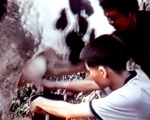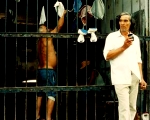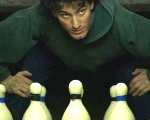friends
 » Levelland / Levelland, Clark Walker, USA, 2003 107′
» Levelland / Levelland, Clark Walker, USA, 2003 107′
In Levelland, a gang of seven skateboarding friends test the limits of freedom in a stifling suburb where fathers are absent and the corporate ladder is crumbling under hard-working moms. What’s there for ringleader brothers Zach and Nick to do all summer — search for skateable terrain in empty pools and drainage ditches in the cul-de-sac landscape or boost lumber to build a backyard halfpipe? Zach has a crush on a pretty girl but he’s fallen into a deceptively easy affair with his drama teacher, who’d like him to run away with her. Older brother Nick is sliding into depression, a smart kid assaulted by the stifling surroundings. Derrick, the youngest of the group, struggles with his father, a football coach who sees skateboarding as hooliganism. Steve skates hard, trying to get his kicks while he can, since his future is limited by his education and his family’s poverty. Tomboy Betty experiences crushes and confusion trying to get by in a male-dominated arena. Her jock brother Matt tries to stay close to the gang by acting as their urban four-wheeling chauffeur.
Brought by Olaf Möller, european editor of the prestigious Film Comment magazine
 » Namibia Crossings – Spirits and Limits / Namibia Crossings – Spirits and Limits, Peter Liechti, SWITZERLAND, 2004 92′
» Namibia Crossings – Spirits and Limits / Namibia Crossings – Spirits and Limits, Peter Liechti, SWITZERLAND, 2004 92′
Peter Liechti had an excellent idea: to travel with 12 musicians across Namibia, the former “Deutsch-Südwestafrika”, where German farmers lived and Africans worked for them. Namibia had an apartheid system: Africans and Europeans, that is, white people and black people, lived in separate townships, and the Germans treated the native black inhabitants like slaves. Nine ethnic groups lived in a territory more than three times the size of Germany, and only 7% of them were of European origin. Yet the minority ruled the country, which was allied with South Africa’s apartheid regime.
Brought by Helmut Groschup, director of the Innsbruck Film Festival
 » Yi zhi hua naeniu / The Black and White Milk Cow , Yang Jin, CHINA, 2004 98′
» Yi zhi hua naeniu / The Black and White Milk Cow , Yang Jin, CHINA, 2004 98′
At his father’s death Jinsheng has to quit school to take care of his grandmother. He returns to his village to substitute the teacher at the request of his uncle, who is the head of the village. Yangjiagou is a poor region, and the officials have nothing better to offer the young man as salary than a milk cow and a school in ruins. But Jinsheng will not be discouraged.
Brought by Martial Knaebel, artistic director of the Fribourg Filmfestival
 » Los muertos / The Dead, Lisandro Alonso, ARGENTINA, 2004 78′
» Los muertos / The Dead, Lisandro Alonso, ARGENTINA, 2004 78′
The Dead opens with an exquisite view into the jungle. The camera leads us through vegetation so dense our eyes cannot penetrate it, eventually taking us into a dark and eerie space to reveal the bodies of two dead youths. The story then jumps forward roughly thirty years. An aging man named Vargas (Argentino Vargas) is released from jail. We follow him on his journey back to the jungle. He makes stops along the way to buy his daughter a shirt, to release sexual tension, and to find a boat to take him downriver.
Brought by Vlado Ĺ kafar, programme director of the Isola Cinema festival
 »Parapalos/Pin Boy
»Parapalos/Pin Boy
,Ana Poliak, ARGENTINA, 2004 90′
Adrián, recently arrived from the countryside, goes to work as a pin-setter in a bowling alley. He shares a small apartment with his cousin, Nancy, who collects Marilyn Monroe memorabilia. Because they work different shifts, they share the same small bed. The job of pin-setting is physically demanding. During the medical examination that opens the film, the doctor warns him that the job “swallows your life.” If you break your leg while dodging the pins, “you have nothing,” no insurance. “The union is not for the poor, it’s for the bosses.” At the bowling alley, Adrián makes the acquaintance of the other pin boys, particularly Nippur, an anarchistic ex-hippie who has been working the job for years. Nippur has his own philosophy about life and work. He hangs up pictures of Andy Warhol and Janis Joplin, he cites Shakespeare. He tells Ringo, “Everything in my life is borrowed, except for freedom.” Another time he says, “I do what I want,” but of course like everybody else, he doesn’t. He thinks about turning to crime, but whom will he rob? Adrián is quiet, observant. He has the capacity to tolerate a great deal, to resist the physical punishment inflicted by the job. But even he has long and horrible days after which his head hurts and he can’t sleep.
Brought by Cis Bierinckx, film curator, writter and producer
harvest| friends| masters| new shores| retrospective- the south of cinema
far east special | special occassion| short films and animation
 » Levelland / Levelland, Clark Walker, USA, 2003 107′
» Levelland / Levelland, Clark Walker, USA, 2003 107′
In Levelland, a gang of seven skateboarding friends test the limits of freedom in a stifling suburb where fathers are absent and the corporate ladder is crumbling under hard-working moms. What’s there for ringleader brothers Zach and Nick to do all summer — search for skateable terrain in empty pools and drainage ditches in the cul-de-sac landscape or boost lumber to build a backyard halfpipe? Zach has a crush on a pretty girl but he’s fallen into a deceptively easy affair with his drama teacher, who’d like him to run away with her. Older brother Nick is sliding into depression, a smart kid assaulted by the stifling surroundings. Derrick, the youngest of the group, struggles with his father, a football coach who sees skateboarding as hooliganism. Steve skates hard, trying to get his kicks while he can, since his future is limited by his education and his family’s poverty. Tomboy Betty experiences crushes and confusion trying to get by in a male-dominated arena. Her jock brother Matt tries to stay close to the gang by acting as their urban four-wheeling chauffeur.
Brought by Olaf Möller, european editor of the prestigious Film Comment magazine
 » Namibia Crossings – Spirits and Limits / Namibia Crossings – Spirits and Limits, Peter Liechti, SWITZERLAND, 2004 92′
» Namibia Crossings – Spirits and Limits / Namibia Crossings – Spirits and Limits, Peter Liechti, SWITZERLAND, 2004 92′
Peter Liechti had an excellent idea: to travel with 12 musicians across Namibia, the former “Deutsch-Südwestafrika”, where German farmers lived and Africans worked for them. Namibia had an apartheid system: Africans and Europeans, that is, white people and black people, lived in separate townships, and the Germans treated the native black inhabitants like slaves. Nine ethnic groups lived in a territory more than three times the size of Germany, and only 7% of them were of European origin. Yet the minority ruled the country, which was allied with South Africa’s apartheid regime.
Brought by Helmut Groschup, director of the Innsbruck Film Festival
 » Yi zhi hua naeniu / The Black and White Milk Cow , Yang Jin, CHINA, 2004 98′
» Yi zhi hua naeniu / The Black and White Milk Cow , Yang Jin, CHINA, 2004 98′
At his father’s death Jinsheng has to quit school to take care of his grandmother. He returns to his village to substitute the teacher at the request of his uncle, who is the head of the village. Yangjiagou is a poor region, and the officials have nothing better to offer the young man as salary than a milk cow and a school in ruins. But Jinsheng will not be discouraged.
Brought by Martial Knaebel, artistic director of the Fribourg Filmfestival
 » Los muertos / The Dead, Lisandro Alonso, ARGENTINA, 2004 78′
» Los muertos / The Dead, Lisandro Alonso, ARGENTINA, 2004 78′
The Dead opens with an exquisite view into the jungle. The camera leads us through vegetation so dense our eyes cannot penetrate it, eventually taking us into a dark and eerie space to reveal the bodies of two dead youths. The story then jumps forward roughly thirty years. An aging man named Vargas (Argentino Vargas) is released from jail. We follow him on his journey back to the jungle. He makes stops along the way to buy his daughter a shirt, to release sexual tension, and to find a boat to take him downriver.
Brought by Vlado Ĺ kafar, programme director of the Isola Cinema festival
 »Parapalos/Pin Boy
»Parapalos/Pin Boy
,Ana Poliak, ARGENTINA, 2004 90′
Adrián, recently arrived from the countryside, goes to work as a pin-setter in a bowling alley. He shares a small apartment with his cousin, Nancy, who collects Marilyn Monroe memorabilia. Because they work different shifts, they share the same small bed. The job of pin-setting is physically demanding. During the medical examination that opens the film, the doctor warns him that the job “swallows your life.” If you break your leg while dodging the pins, “you have nothing,” no insurance. “The union is not for the poor, it’s for the bosses.” At the bowling alley, Adrián makes the acquaintance of the other pin boys, particularly Nippur, an anarchistic ex-hippie who has been working the job for years. Nippur has his own philosophy about life and work. He hangs up pictures of Andy Warhol and Janis Joplin, he cites Shakespeare. He tells Ringo, “Everything in my life is borrowed, except for freedom.” Another time he says, “I do what I want,” but of course like everybody else, he doesn’t. He thinks about turning to crime, but whom will he rob? Adrián is quiet, observant. He has the capacity to tolerate a great deal, to resist the physical punishment inflicted by the job. But even he has long and horrible days after which his head hurts and he can’t sleep.
Brought by Cis Bierinckx, film curator, writter and producer

